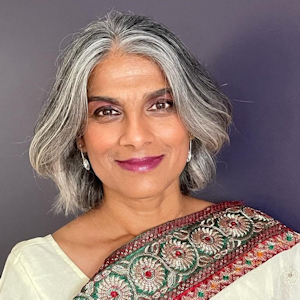“Very few organisations are able to offer the same breadth of work experience, with the ability to work so flexibly, whilst supporting their employees’ developmental training in the way that DE&S does.”

Commercial Officer Hema
Can you tell us about your background?
I joined the MOD in 1998 as a PA to a head of department, while also providing support to the technical team. In 2002, I took a five-year career break and when I returned I was seeking a promotion. An opportunity came up in Commercial, which I successfully applied for. It was a steep learning curve, but I felt I had found my niche as my previous experience was in finance and business roles and the combined experience was beneficial. I really enjoy the stakeholder and supplier management aspect of my role, and how my work can positively influence a supplier’s performance too.
A few years ago, a new opportunity came along to join the Future Maritime Support Programme (FMSP). This was a new team, so I was involved in establishing the team and setting up the governance. We work on some of the largest projects in defence, making it a dynamic and fast paced place to be. I currently manage smaller enabling support contracts and have assisted the team lead with a high value contract. I also manage the resource provided by our delivery partners and I’m the main point of contact for various MOD tools used for tendering, payment, and performance management.
What impact does your role make? What makes it rewarding?
In Commercial it is important to ensure that every supplier is performing as per the terms and conditions of the contract. Our armed forces rely on these contracts to enable them to have the kit and equipment they need to defend and protect us, and it’s one of our organisational priorities to ensure we obtain value for money for the taxpayer. As a civil servant you are serving the nation. Knowing that you are enabling the armed forces to defend the UK and to be ready to assist in disaster zones and provide humanitarian aid is really rewarding.
How does your team support diversity and inclusion?
As a team we proactively promote inclusivity. My team lead at one point was the Race Champion for the Race and Culture Network (RCN), providing a voice for the network at a senior leadership level. He also supported me in shifting my workload to prioritise RCN projects. For example, last year when we were working on a discussion series called ‘Race Matters’, because as an organisation we understand the benefits our networks bring.
What transferable skills might people already possess that would be relevant to a career in your field?
Knowing how to find a bargain, being prepared to negotiate, and being able to listen. Equally, an eye for detail is important as you are required to read and draft clauses to ensure clarity. Record management is also important, so if individuals are good at maintaining paperwork in their personal lives – for example with their finances – then that’s a helpful transferable skill. Finally, when I joined the Commercial function, I didn’t have a lot of commercial knowledge; I picked up the role from other people, learning the language and terminologies they used and looking at contract documents, observing how they were written, so it’s important to use teamwork and communication to develop your knowledge and understanding of the organisation and the role.
You mentioned you’re a part of the Race and Culture network. What’s the role of your network, who does the network offer support to, and what activities, events or training do you offer?
The aim of the Race and Culture Network is to drive meaningful change by championing racial and cultural equality across DE&S and our sister agency, the SDA. We do this by raising awareness of – and celebrating – the racial and cultural diversity inherent within DE&S and SDA, as well as ensuring an inclusive and unbiased working environment for our members and the wider community we represent.
From 2019 until November 2020 I was the Co-Chair of the Race and Culture network and my role was to set the strategy of what the network was going achieve, and also to highlight to the wider business what the network was and what it represented. I am still an active member of the network.
To support and raise awareness of the RCN we run a range of activities. We’ve run coffee mornings where we’ve met employees who come from all around the world, as far as Asia and South America, and we’ve organised English classes to support colleagues who didn’t have English as their first language and were struggling with their writing and speaking – these were really successful and are looking to re-run the sessions. We ’ve also hosted charity bake sales, selling sweet and savoury treats from different parts of the world. This was a great way to raise money for the Charity for Civil Servants and the Air Ambulance, whilst highlighting the diversity of cultures within the organisation and getting the opportunity to try new foods. We’re currently planning to create a cookbook where people can share their favourite recipes from home, alongside their story about why it’s their favourite recipe and their memories of it.
The network’s main aim is to support and connect people from Black, Asian and minority ethnic backgrounds, but it’s open to anyone within the organisation who wants to join or attend one of our events to find out more.
As a network, how do you work with the wider organisation to ensure the best environment possible for every colleague?
The purpose of the network is to provide a platform for the organisation to listen and take interest, and for our members to be in a safe environment where they can get support and be heard. We have a Race Champion who represents the network at a very senior level; it is important to have good engagement with them as they are essential in communicating our thoughts, concerns or ideas to the business and are therefore very influential and significant for the network. We want to ensure DE&S is a great place to work for everyone, whatever their background, and people generally tend to be happier in an organisation where they feel they are represented, and where they are heard.
For the organisation, and more generally, supporting diversity is so important. Diverse people bring diverse experience. Every individual has something different to offer and can bring different skillsets into the team, resulting in a broader thought process. Different people ask different questions which can help challenge the norm and bring innovation into the team and organisation.
Talking more broadly about working for DE&S, what would you say is one of the greatest myths about the organisation?
One of the biggest misperceptions is that you must be part of the armed forces to work here, or you must have been born in the UK and be a UK national. If you need to be a sole UK National for a particular role, it will state this on the job advert. The majority of our colleagues are based in Abbey Wood in Bristol and there are lots of opportunities for people of all backgrounds to join the business and progress their career.
What makes DE&S a great place to build a career?
DE&S is a great place to work in terms of the opportunities and the variety of work that is on offer. If you’re interested in travel, there lots of different places that you could potentially go and work, such as the Falkland Islands, Cyprus, or the USA. The organisation actively encourages employees to obtain professional qualifications, which DE&S funds. They’re really committed to investing in your development and you can progress and expand your skillsets through on-the-job training and mentoring. Very few organisations are able to offer the same breadth of work experience, with the ability to work so flexibly, whilst supporting their employees’ developmental training in the way that DE&S does.
For you, what makes working here special?
I would say it’s the people that make it a special place to work. My team is one the most inclusive teams I’ve worked in. During lockdown we created a daily diary which everyone could contribute to. Each day someone different from the team would complete a template which introduced themselves, their interests and what they were up to. This was something which highlighted the diversity of people within the team, and we got to discover something new about individuals that we didn’t know before. It helped maintain that social environment, which was really nice, but also helped new joiners to get to know everyone better.
Latest Commercial vacancies
Can’t find a Commercial job for you today? Search all our vacancies.


